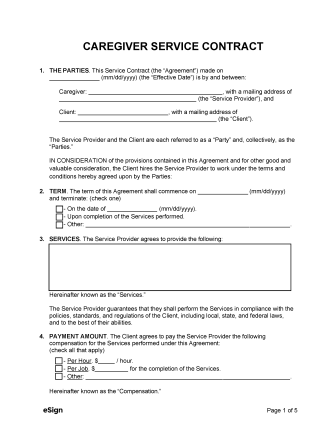

A caregiver service contract is used to hire a professional to care for an individual who requires assistance to live comfortably. The client who hires the caregiver will often be someone other than the care recipient; for instance, their adult child, guardian, or parent. The contract relays the exact services that the caregiver will be required to provide, the schedule they will be expected to follow, and the compensation for their services.
A caregiver is someone who takes care of the elderly, ill, or disabled. Professional caregivers are often trained to administer medication and provide other medical services to individuals that require special assistance. In many cases, a caregiver may be the family member, guardian, or spouse of the care recipient. Even when the caregiver is related to the care recipient, they will still often receive compensation and provide services on a schedule.
Caregivers are required to provide a variety of basic services to ensure a care recipient’s health and comfort. These commonly include the following:
If the caregiver is properly certified, they may also provide nursing services such as administering medication, monitoring health, and providing artificial nutrition and hydration.
When completing a caregiver contract, the following details will need to be included to ensure that all parties understand the agreement:
The names and mailing addresses of the service provider and the client need to be included in the contract. The client may be a relative or guardian of the care recipient.
The beginning date of the agreement will need to be specified. The term of the contract must also be included, either by setting an end date or indicating its method of termination.
The caregiver contract will include all of the tasks and duties that the contractor is required to perform, as well as the frequency and schedule. If the care recipient is an individual other than the paying client, the services section is where they should be identified, including the location where services will be rendered.
The caregiver’s pay rate and frequency will need to be included. Generally they will be paid an hourly rate that they receive on a weekly or bi-weekly basis. Certain jurisdictions may restrict caregivers’ compensation to not exceed the going rate in the area.
The contract must be signed by both parties to be legally binding. Some states also require a notary acknowledgment.
The are several important benefits of drafting a caregiver contract:
Caregiver certification requirements vary a great deal from state to state. Certification generally isn’t required to provide basic caregiving services such as cooking, cleaning, bathing, and accompaniment. However, licenses are required to provide most medical services and to work for Medicare-certified caregiving agencies.
Common caregiver certifications: